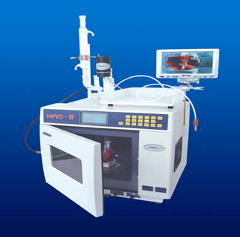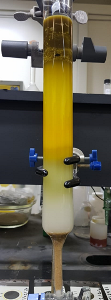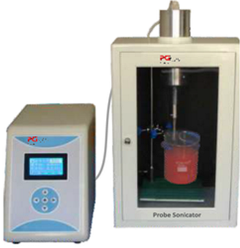Corrosion Inhibitor Synthesis and Testing
Corrosion inhibitors are chemical substances that, when added in small amounts to the environment in which metal would corrode, will reduce, slow down or prevent its corrosion. With this, metallic parts of processing equipment, for instance, once appropriately protected with corrosion inhibitors, maintain suitably prolonged service life.
- We use organic synthesis and extraction from natural products approaches in discovering effective corrosion inhibitors for application in diverse corrosive environments such as oil well acidization, sweet corrosion, sour corrosion, acid cleaning, descaling, etc.
- We adopt different approaches including microwave-assisted, ultrasound-assisted, and one-pot multi-component reactions apart from the conventional synthetic approach to synthesis different chemistry of organic molecules as potential corrosion inhibitors.
In addition to their environmentally friendly and ecologically acceptable features, many plant extracts are low cost, readily available, and renewable sources of materials of prospective industrial significance. The primary criticism of the use of biomass extracts of plant origin as corrosion inhibitors is the inability to determine the specific component(s) that is/are responsible for the inhibition of corrosion because plant extracts are an incredibly rich source of natural chemical compounds (e.g., amino and organic acids, glucosinolates, alkaloids, polyphenols, flavonoids, and tannins) and are composed of mixtures of organic compounds.
- In an attempt to address the identified drawbacks, we are isolating known compounds from extracts of plants of Saudi Arabia origin using a combination of conventional chromatographic techniques and sophisticated analytical tools of separation and purification. The isolated compounds after proper identification are evaluated as potential corrosion inhibitors in different corrosive media.
Below are some of the equipment utilized in our Center for corrosion inhibitors synthesis and/or extraction, characterization, and evaluation
- Microwave reactor
- Ultrasonic prob sonicator
- Nuclear Magnetic Resonance
- Soxhlet extractor
- Mass spectrophotometer
- Chromatography techniques
- Gamry potentiostats
- VerSASTATS Electrochemical workstation
- Rotating Cylinder Electrode
- High Temperature/High-Pressure (HTHP) autoclaves

Microwave Technique

A colum chromatography

Ultrasound Technique